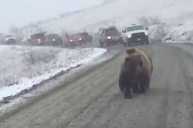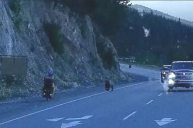Thomas D. Mangelsen is an acclaimed wildlife photographer. His work has won awards and hangs in galleries all over the country, including the Smithsonian. He's also been the subject of countless documentaries and honored by academia and prestigious groups. But none of that mattered in traffic court recently.
Last week, federal judge Mark L. Carman ruled against Mangelsen, saying that the government met the burden of proof when an official cited him for causing a traffic jam on Oct. 9, 2023. "While some slowing by the traffic upon seeing a vehicle on the side of the roadway is understandable, the speeds driven by (Mangelsen) were far below the normal flow of traffic and resulted to buildup of traffic, and potential safety hazard for the public," Carman wrote in his 10-page decision.
The government argued Mangelsen caused a 'bear jam'
According to the ruling, authorities responded to an incident in which a vehicle struck a grizzly bear inside Grand Teton National Park. The respondent, Tyler Brasington, a park bear specialist, was first on the scene. So if he saw a vehicle slow down too much, he'd gesture for them to move on. In doing so, he intended to prevent a "bear jam," meaning a traffic jam caused by spectators trying to see the bear.
In this case, the victim bear was Grizzly 610, the daughter of the famed bear Grizzly 399, which was the subject of one of Mengelsen's projects. For his 2015 book, Grizzlies of Pilgrim Creek, he documented Grizzly 399's life over 10 years. He recorded her life as a bear and mother, and in turn, made her one of the most famous grizzlies in the world.
While managing traffic, Brasington said that he saw Mangelsen drive by repeatedly at a very slow rate of speed — what the judge described called "walking speed." Brasington also testified that he thought Mangelsen's driving created a safety risk, so he gestured and verbally directed him to move on. He said he saw between one and four vehicles behind Mangelsen's vehicle.
View this post on Instagram
After driving by at least four times, Mangelsen pulled to the side of the road and stopped about 100 yards away from Brasington. Although he eventually pulled away, he then turned around as the grizzly bear became more aware and her yearling cubs appeared and entered the highway. At that point, Park Ranger Bret Timm confronted Mangelsen about his driving and cited him for obstruction of traffic.
"I was driving really slowly because was caring about the bear."
In his defense, Mangelsen denied that he obstructed traffic. Although he said he drove slower than the speed limit and passed by multiple times, he argued he never saw four cars backed up behind him. He also argued that he believed driving slower would be safer for the bears and his intention was to protect the bears.
Mangelsen also brought up an incident in which he was cited under very similar circumstances. However, the charges were dismissed as Brasington said that Mangelsen helped control the situation by driving slowly back and forth through a bear jam.
For his ruling, the judge said he relied heavily on Timm's body camera video and radio chatter recorded by the park's law enforcement agency. Although the video didn't capture the full interaction, the judge said you could see or hear other vehicles on the roadway. He also relied on the testimony of the two park officials.
"While (Mangelsen) believes that his actions were justified based upon his concerns for the safety of the bears, he did in fact obstruct traffic," the judge wrote.
Mangelsen said he spent about $20,000 on his legal defense challenging the $150 ticket. "I did exactly the right thing a person with common sense and a brain would do under the circumstances," the told WyoFile. He added that he planned to appeal the ruling after sentencing.




